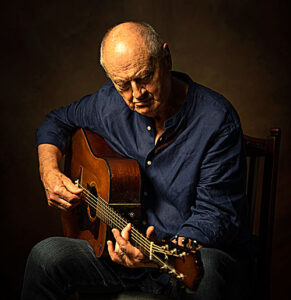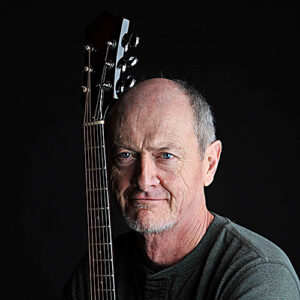
Freddie White, who plays The Irish Cultural Centre in Hammersmith this week, told David Hennessy about following Emmylou Harris, his memories of the late Vince Power and when he had to pack music in for plumbing.
Singer- songwriter Freddie White plays The Irish Cultural Centre in Hammersmith this week.
He has captivated audiences in Ireland and beyond with his emotive performances and opened for big names such as Clannad and Eric Clapton.
White has been touring internationally since the 1980s, solo as well as with various bands.
He performs interpretations of work of some of his favorite performers, such as Randy Newman, John Hiatt, Tom Waits and Guy Clark as well as some jazz standards and his own compositions.
Born in Cobh into a musical family, by the age of thirteen White was playing in school bands and by seventeen playing professionally.
He came to London in 1970, and at the age of 19, where he stayed for about two years – to busk and perfect his unique style of singing and guitar accompaniment.
In 1974, he was a founding member of the band that would become Scullion, together with Philip King and Sonny Condell. Later he formed The Fake, regarded as one of the seminal Irish bands of the late ‘70’s. Next came The Freddie White Band formed in 1978, which toured with Eric Clapton that year.
He also toured as the opening act for Clannad with their producer/sound manager Nicky Ryan recording those gigs, and providing selections to compile into White’s first album Recorded Live on Tour 1978.
Are you looking forward to coming back to London? “Yeah, very much so.
“I spent a lot of my misspent youth over there busking the subways and in Marble Arch in London and places like that, very early 70s.
“I slept on people’s floors mainly. I eventually got a bedsit above an old friend of mine in Bounds Green but I was just bobbing around being a hippie at that time.”
It was where you started in a way, wasn’t it? You perfected your style here? “I learned a lot there about projection because really before that I was basically a guitar player fingerpicking.
“I used to go into the subway and sit down in a corner of the subway and play my guitar and be ignored by everybody.
“So I said, ‘I better sing a song’.
“So I started singing and I basically learned how to sing in those subways where the sound is nice, you have a nice natural echo chamber.
“I could make a bit of noise and get noticed that way.
“I came back to Ireland and started playing in clubs in Dublin eventually and that’s where it really took off, my career, as such.”
You have also had stints in Australia and the United States, is it good to be back in Ireland? “Yeah, although I did love Sydney, I’ve got to say.
“It’s hard to beat that climate, ya know?
“Outdoor living is pretty nice over there.
“We get about a week of it here in the west of Ireland.
How did you find Sydney?
“I did play some lovely gigs down there.
“I did a few festivals.
“I did the National Folk Festival and I did the Fairbridge Festival out in Western Australia.
“They were fantastic events altogether.
“They really know how to run them and of course they have the weather for the outdoor festival all year round, they basically run for ten months of the year.
“I did quite a few of them in and around Sydney and elsewhere.
“I had some nice gigs and I was kind of beginning to get a bit of a foothold there but then we decided to move.
“My wife’s job took her to New York so I was like, ‘Let’s go to New York for a while’.
“So we did.”

You also spent time in Boston..
“I did.
“I spent many years there.
“I played a few clubs and stuff but in the end, it broke my heart so I packed it in for a while and became a plumber.”
Why did it break your heart?
“Just noisy pubs with people that weren’t really interested in what you were doing.
“I don’t really play what people would be wanting to listen to in pubs: ‘Play something we know’.
“That’s not what I do.”
How would you describe what you do? It’s been said that you don’t cover other people’s songs, you perfect them..
“That’s very complimentary.
“But what I try and do is faithfully interpret good material.
“Good songs.
“I’ve covered people like Randy Newman, John Hiatt, Tom Waits, Guy Clarke, Joni Mitchell, all the greats.
“I love their work and I sing their songs mostly.
“I have some original songs also, some that passed the test.
“That’s what I try and do.
“People say ‘you do a great job on it’, interpreting other people’s music.
“I’m grateful for the compliment obviously but I still like to listen to the originals.”
What can people expect from your upcoming gig in Hammersmith?
“It will be some of the old, some of the new I’ll be playing when I come over.
“People do want to hear songs that I’ve been doing for years, so that’s fine. I don’t mind doing them but there’s some new stuff in there as well that I hope people will like.
“It’s been quite a while since I played in London.
“A few years ago I played in a little restaurant down in Mayfair, Vince Power ran a gig down there.”

It was very sad about Vince Power passing away recently, wasn’t it?
“Very sad.
“I went to his funeral down in Tramore.
“Very sad occasion.
“I was very fond of Vince.
“I travelled to the Mean Fiddler over the years many, many times playing solo there and playing with bands.
“I always found him to be a great gentleman.
“It was a great, great club. Really well run club.
“It was a proper music venue.
“He really knew how to do it.
“As everybody knows, he was a great club owner.
“He was a great man.”
He loved the music. Was it always going to be music for you?
“I think so.
“I was 12 or 13 when I picked up a guitar first, I never really put it down.
“It consumed me to the detriment of everything else that I was supposed to be doing at the time like going to school.
“It completely took over my life.
“I was listening to records over and over again to try and learn the licks that were on them.
“I would pick up the needle, put it back again. Pick up the needle, put it back again until I got the bloody thing right.
“It was burned into my brain so I eventually knew how to pick the tune out on the guitar, that’s how I learned.”
It must have been a shock to the system and very sad even to not be playing music when you were, instead, plumbing for a living in Boston…
“It was. I had two kids that were going through private schools over there, I had to make money somehow.
“That seemed a way to do it so I actually became an apprentice.
“I was probably the oldest apprentice in the states at the time.
“I actually signed up to be an apprentice and eventually qualified and made good money for a while, managed to get the kids through college.
“And then I said, ‘Enough of that’.
“And I packed it in and started touring again.
“I was actually always touring even when I was working as a plumber.
“I would always come home and tour here because I always had a bit of a rep here so I could always do that.
“Over there it was tougher.
“I played the odd nice gig and then there would be nothing for another two months so I had to do something to make life liveable.
“I’d say one thing, it’s not such a bad job actually.
“The one thing about it is that when you knock on somebody’s door when they’re looking for a plumber, they’re so happy to see you.
“People are so happy to see a plumber arrive when they have a problem, when they’re trying to get some work done because everything has to wait until the plumber does his job, then everything can proceed.
“Everybody’s really glad to see you when you’re a plumber.
“That’s for sure.
“There was some decent things about the job.
“I didn’t hate it completely.
“You’ve got to live somehow and you’ve got to make allowances and you’ve got to just compromise your life sometimes to make things work.”
You have played some great shows with some great people, what stands out as the highlights? “There are lots of highlight, but I really enjoy what I do and play lovely, lovely concerts.
“I played the Lisdoonvarna Festival a couple of times just up the road here,
“I live in Doolin, Co. Clare and the festival was literally about a mile down the road.
“I played immediately after Emmylou Harris and that was the biggest crowd I think I ever played to.
“That was just unbelievable: A sea of people.
“That was a bit awe-inspiring.
“Those Clannad gigs were nice as well. I played in theatres all over England and Scotland, and Wales.
“I did a big tour with them back in the 80s.
“I recorded my first album playing with them as well.
“My very first album was a live album recorded when I was on tour with them.
“That’s how it happened.
“I’m looking forward to playing that gig in London.
“I’m really enjoying life so long may it last.”
You have played in various bands but more often solo, are you happier doing it solo?
“I think I am happier playing solo because it takes a lot of the stress out of it.
“With a band, you have to rehearse.
“You have to have everybody on the same page, of the same mind.
“It’s difficult.
“And then you divide the money up at the end of the night and there’s not enough for anybody to live on.
“It’s very hard. You need to be completely dedicated to that.
“All my life I’ve been playing solo because it works really well.
“I love doing it and it seems to be what people prefer anyway about my activity, so I think I’ll stick to it.
“I do love playing with other people and I have loved it.
“Those bands were great while they lasted and were good fun.”
Could you have foreseen your career, playing all around the world, when you were first learning your trade in subways in London?
“I think when I was young, I was just drifting around.
“I didn’t really think of music as a career as such.
“It was just craic basically, I was having a good time: Just drifting and busking and having fun.”
And hopefully you still are, do you still enjoy it?
“Absolutely.
“I absolutely love it, and it’s a total pleasure and a total privilege to be able to still do it, I’ve gotta say.
“I love what I do.”
Freddie White plays The Irish Cultural Centre on Thursday 23 May.
For tickets and information, click here.
For more information about Freddie, click here.



